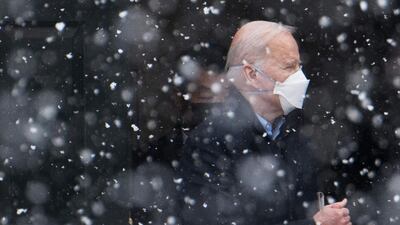US President Joe Biden on Sunday said Tehran must halt nuclear enrichment before Washington lifted any sanctions on the regime, making a return to the deal look distant.
The US would not lift sanctions merely to bring Iran back to the negotiating table, Mr Biden told CBS, in his most explicit rejection of Iranian demands since he came to office last month.
But a senior US official later on Sunday told Reuters that the US President “meant that Iran has to stop enriching beyond the limits under the Iran nuclear deal [3.67 percent].”
The White House, however, confirmed that lifting sanctions will not be offered to return to the table as Iran has demanded.
But Iranian officials have insisted that the US lift sanctions before it reverses nuclear development.
"Iran has fulfilled all its obligations under the 2015 nuclear deal, not the United States and the three European countries,” Iran’s supreme leader Ayatollah Ali Khamenei told a gathering of air force commanders on Sunday.
"If they want Iran to return to its commitments, the United States must lift all sanctions first."
Mr Biden’s predecessor, Donald Trump, pulled out of the 2015 deal, which also includes Britain, China, France, Germany and Russia, in May 2018.
Since then, Iran has increased enrichment of uranium.
Recent estimates by the International Atomic Energy Agency put Iran’s stock of enriched uranium at 2.4 tonnes, more than 10 times what is allowed under the agreement.
In January Iran began enriching uranium to 20 per cent in another contravention of the deal, which limits production to a purity of 3.67 per cent.
Weapons-grade uranium is enriched to 90 per cent.
State Department spokesman Ned Price said last week that new Iran envoy Robert Malley is focused on consulting with allies about the best approach and denied any contact with Iranian officials so far.
Secretary of State Antony Blinken has held talks with the foreign ministers of Britain, France, Russia, Germany, the UAE and Saudi Arabia in the past week.
US National Security Adviser Jake Sullivan warned recently of an “escalating nuclear crisis”, saying the Iran programme had “advanced dramatically” since the Trump administration abandoned the deal in 2018.
Mr Sullivan urged a return to the deal as a way "to put Iran's nuclear programme in a box”.
That would allow for a "global effort" to take on other Iranian challenges such as ballistic missiles. He called returning to the deal a "critical early priority".
A State Department official also told The National on Sunday that Iran's compliance would be required before such a return.
“As the President and Secretary Blinken have said, if Iran comes back into full compliance with its obligations under the [deal], the United States would do the same thing, and then use that as a platform to build a longer and stronger agreement that also addresses other areas of concern,” the official said.


